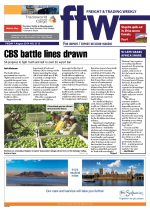Any European Union (EU) and
US sanctions against Russia
are unlikely to have any sort
of direct impact on SA-Russia
trade, according to trade
analyst Duncan Bonnett of Liz
Whitehouse & Associates.
“Anyway, our trade with
Russia is pretty small,” he said.
Indeed, the department
of trade and industry (dti)
statistics revealed that in
2013 SA exported just under
R3.9 billion of goods and
services to Russia, the bulk
of which were oil products,
chemical products, transport
equipment, machinery, food
and agricultural products, and
wood.
And SA imported a margin
over R3.6bn – mostly metals
(aluminium being a prime one),
wood, fertilisers, foods (in the
form of fruits and vegetables),
raw materials, and alcoholic
and non-alcoholic beverages.
Also, Bonnett told FTW,
the proposed sanctions are
only asset freezes and travel
bans aimed at individuals in
President Vladimir Putin’s
inner circle – and, in the US
case, at companies linked to
these individuals. However,
US politicians are currently
debating a new round of even
tighter sanctions
In the EU, members
of European parliament
(MEPs) have also called for
heightened sanctions, and the
bloc’s foreign ministers for
measures that could hit “access
to capital markets, defence,
dual-use goods, and sensitive
technologies, including in the
energy sector”.
But up to now, the EU
has tended to shy away from
extending sanctions to include
major Russian companies. The
reason, according to much
of the European media, is a
worry that Russian President
Vladimir Putin
could respond
with economic
penalties of his
own. It is felt
that this would
be a problem
for European
industry in
several countries
if Russia were
to retaliate with
energy sanctions
– like cutting
off vital gas
supplies.
“If the
sanctions were applicable to EU
and US companies operating
in this country – mostly in the
automotive and energy sectors
– it might have an effect on
these companies,” said Bonnett.
“But I can’t think they’d be
doing their Russian business
from here.”
He also rejected the
likelihood of sanctions affecting
SA mining companies which
are developing projects in
Russia, or the limited financial
services involvement with
Russia in this
country.
“I don’t
think we’ve got
a dog in that
fight,” Bonnett
quipped.
A policy
briefing called
“Russia–SA
Relations” –
presented to the
SA Institute of
International
Affairs (SAIIA)
last year –
reveals in some
detail the involvement between
the two states.
The development of mineral
resources – particularly
diamonds, gold, manganese,
platinum group metals, and
rare earth elements, it said, is
one of the most promising areas
of bilateral co-operation.
INSERT & CAPTION
The proposed
sanctions are only
asset freezes and
travel bans aimed
at individuals in
President Vladimir
Putin’s inner circle.
– Duncan Bonnett

